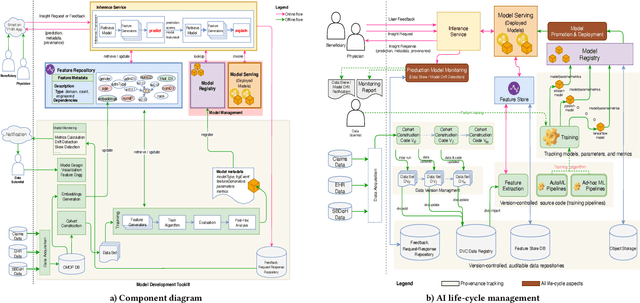Divya Pathak
IBM
Detecting Silent Failures in Multi-Agentic AI Trajectories
Nov 06, 2025Abstract:Multi-Agentic AI systems, powered by large language models (LLMs), are inherently non-deterministic and prone to silent failures such as drift, cycles, and missing details in outputs, which are difficult to detect. We introduce the task of anomaly detection in agentic trajectories to identify these failures and present a dataset curation pipeline that captures user behavior, agent non-determinism, and LLM variation. Using this pipeline, we curate and label two benchmark datasets comprising \textbf{4,275 and 894} trajectories from Multi-Agentic AI systems. Benchmarking anomaly detection methods on these datasets, we show that supervised (XGBoost) and semi-supervised (SVDD) approaches perform comparably, achieving accuracies up to 98% and 96%, respectively. This work provides the first systematic study of anomaly detection in Multi-Agentic AI systems, offering datasets, benchmarks, and insights to guide future research.
ITBench: Evaluating AI Agents across Diverse Real-World IT Automation Tasks
Feb 07, 2025



Abstract:Realizing the vision of using AI agents to automate critical IT tasks depends on the ability to measure and understand effectiveness of proposed solutions. We introduce ITBench, a framework that offers a systematic methodology for benchmarking AI agents to address real-world IT automation tasks. Our initial release targets three key areas: Site Reliability Engineering (SRE), Compliance and Security Operations (CISO), and Financial Operations (FinOps). The design enables AI researchers to understand the challenges and opportunities of AI agents for IT automation with push-button workflows and interpretable metrics. ITBench includes an initial set of 94 real-world scenarios, which can be easily extended by community contributions. Our results show that agents powered by state-of-the-art models resolve only 13.8% of SRE scenarios, 25.2% of CISO scenarios, and 0% of FinOps scenarios. We expect ITBench to be a key enabler of AI-driven IT automation that is correct, safe, and fast.
A Novel Methodology For Crowdsourcing AI Models in an Enterprise
Mar 22, 2021
Abstract:The evolution of AI is advancing rapidly, creating both challenges and opportunities for industry-community collaboration. In this work, we present a novel methodology aiming to facilitate this collaboration through crowdsourcing of AI models. Concretely, we have implemented a system and a process that any organization can easily adopt to host AI competitions. The system allows them to automatically harvest and evaluate the submitted models against in-house proprietary data and also to incorporate them as reusable services in a product.
WNTRAC: Artificial Intelligence Assisted Tracking of Non-pharmaceutical Interventions Implemented Worldwide for COVID-19
Sep 16, 2020



Abstract:The Coronavirus disease 2019 (COVID-19) global pandemic has transformed almost every facet of human society throughout the world. Against an emerging, highly transmissible disease with no definitive treatment or vaccine, governments worldwide have implemented non-pharmaceutical intervention (NPI) to slow the spread of the virus. Examples of such interventions include community actions (e.g. school closures, restrictions on mass gatherings), individual actions (e.g. mask wearing, self-quarantine), and environmental actions (e.g. public facility cleaning). We present the Worldwide Non-pharmaceutical Interventions Tracker for COVID-19 (WNTRAC), a comprehensive dataset consisting of over 6,000 NPIs implemented worldwide since the start of the pandemic. WNTRAC covers NPIs implemented across 261 countries and territories, and classifies NPI measures into a taxonomy of sixteen NPI types. NPI measures are automatically extracted daily from Wikipedia articles using natural language processing techniques and manually validated to ensure accuracy and veracity. We hope that the dataset is valuable for policymakers, public health leaders, and researchers in modeling and analysis efforts for controlling the spread of COVID-19.
A Canonical Architecture For Predictive Analytics on Longitudinal Patient Records
Jul 24, 2020
Abstract:Many institutions within the healthcare ecosystem are making significant investments in AI technologies to optimize their business operations at lower cost with improved patient outcomes. Despite the hype with AI, the full realization of this potential is seriously hindered by several systemic problems, including data privacy, security, bias, fairness, and explainability. In this paper, we propose a novel canonical architecture for the development of AI models in healthcare that addresses these challenges. This system enables the creation and management of AI predictive models throughout all the phases of their life cycle, including data ingestion, model building, and model promotion in production environments. This paper describes this architecture in detail, along with a qualitative evaluation of our experience of using it on real world problems.
 Add to Chrome
Add to Chrome Add to Firefox
Add to Firefox Add to Edge
Add to Edge